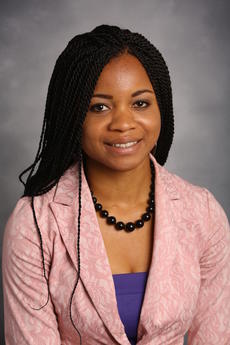
The 10th International Aids Society Conference on HIV Sciences was held July 21-24, 2019 in Mexico City, Mexico. The conference is the world’s most influential meeting on HIV research and its applications. Prosperity Eneh (PharmD, MS) attended the conference and had the opportunity to present the results of her research.
Eneh received her PharmD from the University of Minnesota College of Pharmacy in 2017 and continued on with a combined Masters in Social and Administrative Pharmacy and a Global Pharmacy Engagement, Education and Research Fellowship.
Eneh is very happy about her experience at the conference because of the great learning and networking opportunity that the conference provided. She also valued the unique opportunities that being a presenter afforded her.
“Presenting at this conference was fantastic,” Eneh said. “Even as a poster presentation, I was able to engage with more than a handful of conference attendees that stopped by and asked questions. It was great to discuss my project findings with professionals with varying views and also receive feedback for updating the manuscript that I am currently working on for this project.”
The research she presented at the conference was based on her work with Dr. Melanie Nicol and her teams in Minnesota and Uganda. The project involved evaluating potential drug-drug interactions (pDDIs) during hospital stay for persons living with HIV and suspected cryptococcal meningitis. She presented her research and why it is important at the conference.
“[Patients] that met eligibility requirements were enrolled in ongoing clinical trials,” Eneh said. “I did a retrospective review of these previous studies to characterize the frequency and types of pDDIs involving these patients. Resource-limited settings in sub-Saharan Africa often lack adequate therapeutic drug monitoring and other laboratory follow up during course of therapy to monitor outcomes from potentially interacting drugs. Hence, identification of common pDDIs in this population, in addition to risk factors that can predict the likelihood of an adverse effect, is crucial for patient safety.”
Eneh was one of the conference's youth ambassadors. This allowed her to be plugged into the conference in many ways. Eneh and her fellow ambassadors had meetings with IAS leadership, plenary speakers and other policy makers from different countries. They had front row seating at plenary sessions. There was also programming for networking, career building, article writing and advocacy training.
“I do not think I have been to any other conference so far that gave me this kind of exposure and I am so grateful for this time I had in Mexico,” Eneh said.
In the future, Eneh hopes to continue outcomes research in this field and expand it to include advocacy and policy work in an academic, government or non-profit institution.
She believes the connections she made at the conference will help her in doing this down the line.
“Beyond what I have learned from this conference, I think what affects my future career the most is the connections I have made,” Eneh said. “I am now connected to a group of younger professionals in this field and I look to them as future colleagues and collaborators.”
In addition to making connections and learning more about HIV research, Eneh was able to enjoy Mexico. She spent five days in Mexico and was able to go on a tour of the Teotihuacan Pyramids, Tlatelolco, and historical Guadalupe Shrine. She also went to a couple museums and made good use of google translate.
“It was a great introduction to a bit of Mexican history and I loved every minute of it,” Eneh said. “I am thankful for Google translate as I do not speak any Spanish but was able to pick up a few vital words after my stay there.”
Eneh believes international conferences like the IAS Conference on HIV Sciences are extremely important because it brings many countries together. She said it is vital to have an exchange of ideas between people from various places around the world because HIV is a global burden that affects more people outside USA.
“In the USA, things are done a certain way, but I find it fascinating to discuss and learn about how it’s done in other places,” Eneh said. “I would absolutely go again.”